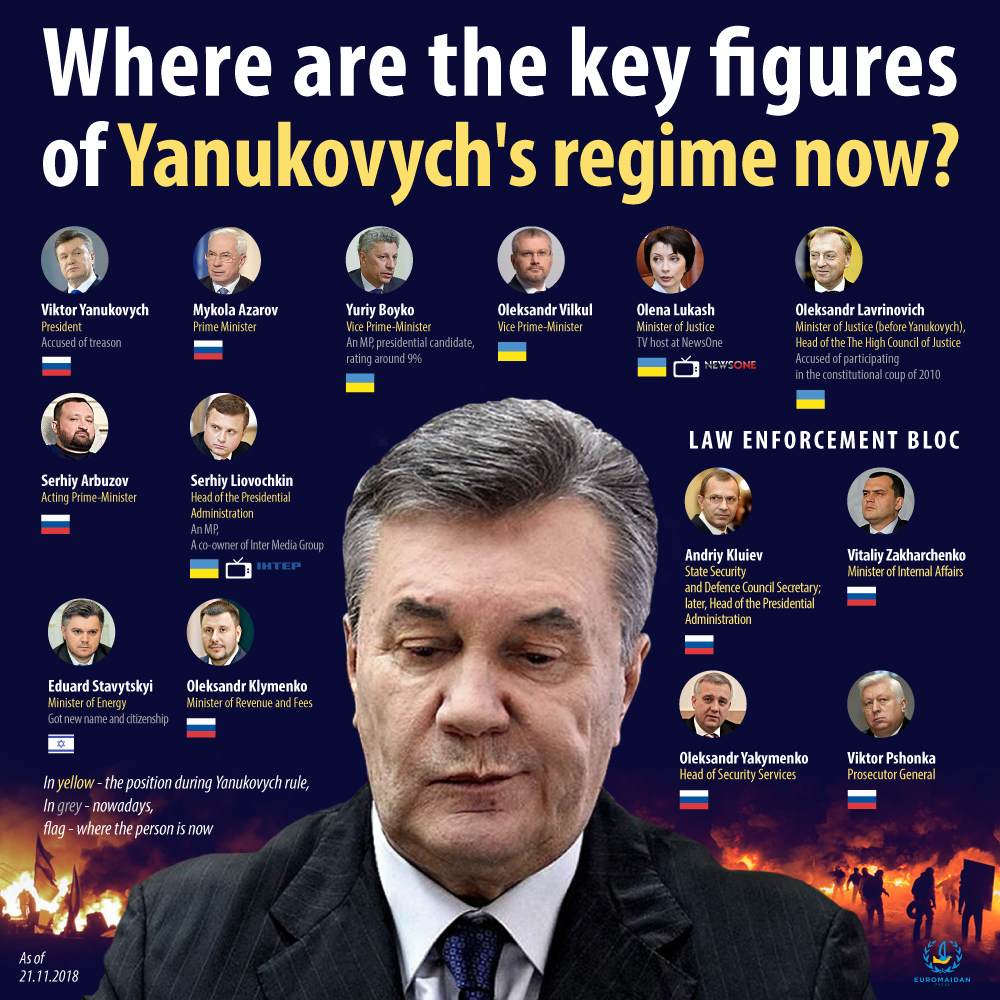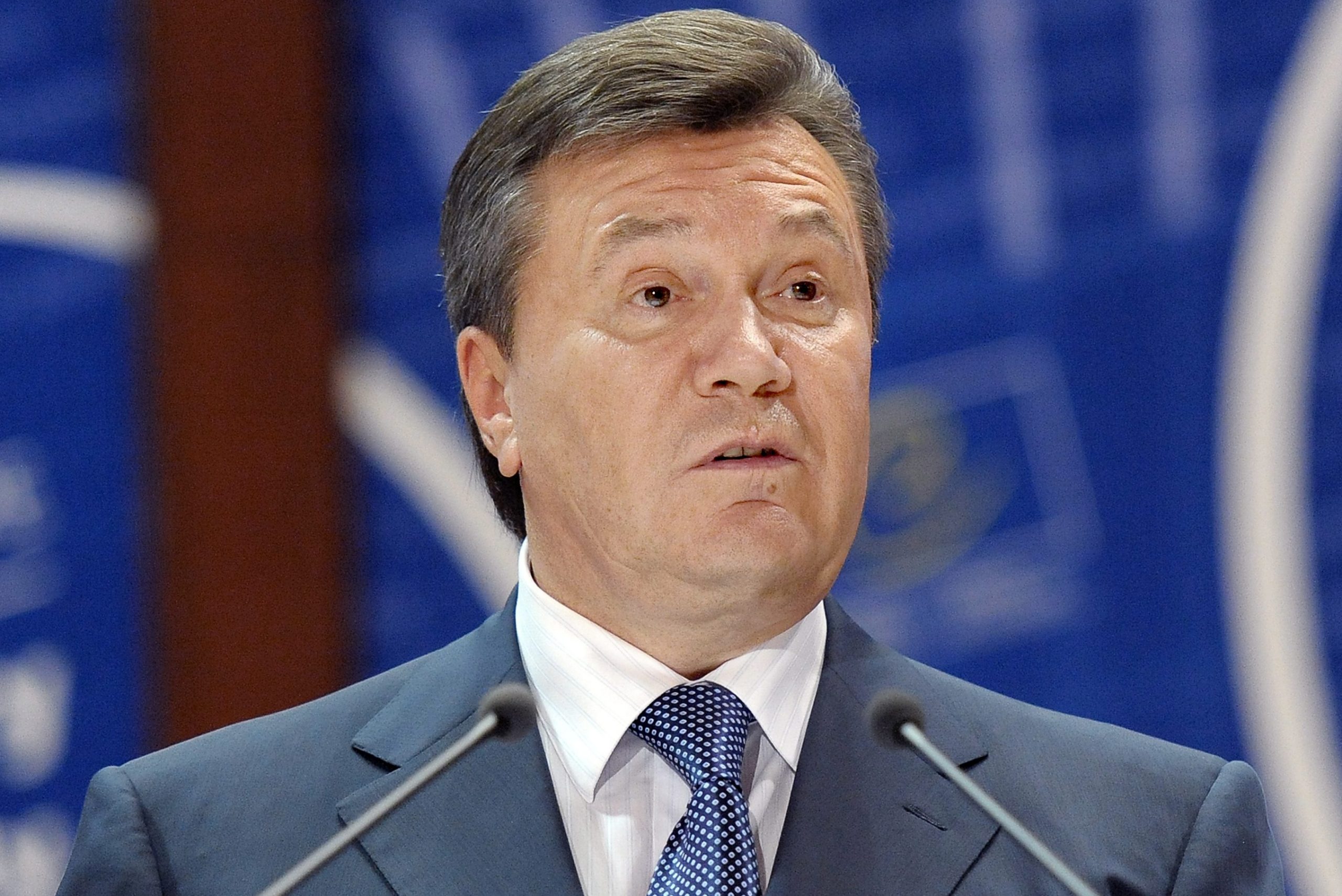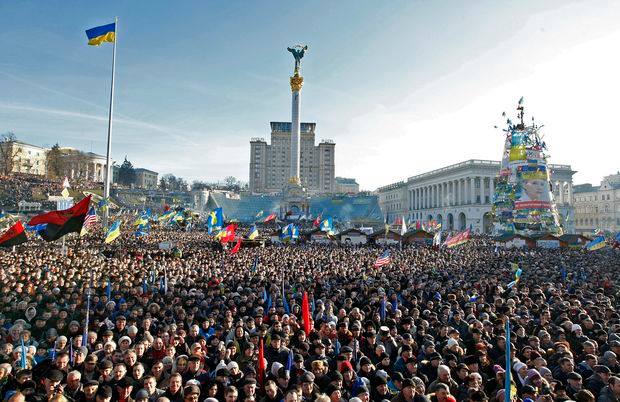Five years later, a shadow of his wrongdoings still hangs over Ukraine’s current politics and business. Moreover, some key figures of his regime still have influence in Ukraine. Euromaidan Press checked what happened to the main actors who helped Yanukovych usurp power.
Just after the revolution, dozens of people from Viktor Yanukovych’s inner circle were declared wanted as such who were related to crimes against Euromaidan activists. Now courts consider the majority of their cases in absentia. Some of them are simply closed.
Just after the revolution, the EU adopted sanctions against 22 officials of Yanukovych’s times and people connected to them. Similar measures were undertaken by the governments of the US, Canada, and Switzerland. Their bank accounts were arrested by Switzerland, Latvia and Likhtenshtein.
The main actor

Yanukovych himself is accused in treason. After his escape to the Russian Federation in February 2014, he asked Vladimir Putin to use his forces to “restore legitimacy” in Ukraine. Also, the ex-president is suspected in aiding Russia’s actions directed towards changing the boundaries of the state border of Ukraine and conducting the war against Ukraine.
Yanukovych’s last word in the court (via video conference) was scheduled for 19 November 2018. However, on the eve of the conference, he was allegedly seriously injured when playing tennis. Later his lawyer confirmed the information and said that Yanukovych is not able to talk in court.
The main ministers

Escaped to Russia. On 21 November 2013, the Cabinet of Ministers of Ukraine headed by Mykola Azarov passed a resolution on suspending the process of signing the Association Agreement with the EU, which should have been signed during the Eastern Partnership Summit in Vilnius. This was the last straw which made people gather to protest in the main square of Kyiv.
In January 2014, Azarov resigned. Following the provisions of the Constitution, all his government resigned as well. Azarov said he did it to for the sake of “additional opportunities for a socio-political compromise and peaceful settlement of the conflict.” Then he fled to Austria.
After the tragical events of Euromaidan Revolution, when dozens of protesters were killed (they are referred to as the “Heaven’s Hundred”) and after Yanukovych escaped, the government of Austria and Switzerland announced the arrest of Azarov’s assets in order to prevent the risk of illegal appropriation of Ukrainian state assets. In March 2014, he was included to the list of 17 people from Yanukovych’s inner circle whose funds were blocked by the Council of European Union. These people were suspected in the illegal use of funds from the state budget.
Later Azarov and his family moved to Russia. Together with other ex-top officials of Yanukovych’s times, there he founded the so-called Rescue Committee of Ukraine.
“We will return to Ukraine for sure and will renew it by changing the political course,” promised Azarov.
Serhiy Arbuzov replaced Azarov and had been working as acting Prime Minister until the temporary government of Arseniy Yatseniuk was appointed. Arbuzov is charged with appropriation of UAH 120 mn ($4.29 mn) during founding the TV channel BTB. His lawyers refute the accusations. Arbuzov is among the Yanukovych regime officials hiding in Russia.
While ex-Prime Minister Azarov only promises to return to Ukraine, some other key ministers of the Yanukovych regime haven’t left it and still hold quite important positions.

Candidate for the chair of President of Ukraine. For example, Yuriy Boiko, ex- Vice Prime Minister in Azarov’s government, is running for president. According to the polls, so far he is supported by about 9% of those who would vote. Boiko is considered the main candidate of the so-called revanchists - politicians of the Yanukovych times with a pro-Russian stance.
In Ukraine, Boiko has been repeatedly accused in corruption, but each time he managed to get away scot-free. One case concerns drilling derricks for gas extraction in the Black Sea which were purchased in 2011, when Boiko used to work as a Minister of Energy and Coal Industry. A subsidiary company of the state enterprise Naftogaz purchased a drilling rig from some British company for $400 mn. Only two companies took part in the tender. Their nominal owners were a Latvian false lawyer and a Latvian homeless person. The Ukrainian government overpaid $150 mn. Thanks to another shadow deal, the second drill was purchased for almost the same amount and overpay. The criminal case which received the name “Boiko’s drills” is still ongoing. The Prosecutor General Office conducted an investigation regarding the purchases, identifying the names of the involved people. However, Boiko was not among them.
“Mr. Lutsenko [the Prosecutor General] does not see Boiko’s involvement in the ‘Boiko drills’ case. They [Prosecutor General Office] had benefits from selling a part of the cases, probably for money. And a part has not been finished on political motives. Poroshenko needs Boiko in the second round [of the presidential elections],” said the head of the NGO Anti-Corruption Centre Vitaliy Shabunin.
Indeed, the fear of a revanche of pro-Russian forces in Ukraine is the key point Poroshenko’s strategists stress in his campaign. Its aim is to make any other choice except the current president impossible.
Read also: “Savior of the nation”: how Poroshenko bets on fear of Russia in bid to get reelected
Boiko was one of 36 MPs who on 18 January 2018 voted against the so-called Law on Donbas reintegration, which proclaims Ukrainian sovereignty over the occupied territories of Donetsk and Luhansk Oblasts. The law recognizes the Russian Federation as a country-aggressor for the first time in Ukraine’s legislation, as well as designating the Russian-backed “republics” in eastern Ukraine as occupied territory. Not supporting it indicates a pro-Russian policy. However, Opposition Bloc representatives, among them Boiko, claimed that the law violates Minsk agreements and separates Ukraine.
After the revolution, Boiko was a member of the Opposition Bloc, the successor of Yanukovych’s Party of Regions. However, on 20 November 2018, he was excluded from the party for organizing a new political platform “Za Zhyttia” together with Vadym Rabynovych, another odious politician. The platform will be transformed into a political party.

Keeping a grip on the home ground. Oleksandr Vilkul, another one of Azarov’s ex-Vice Prime Ministers, is a well known figure in Dnipropetrovsk Oblast, where he worked as a governor before being promoted to Azarov’s team. During the Euromaidan revolution, local activists accused him in organizing rent-a-thug mobs (called “titushky” in Ukrainian) to attack and disperse the peaceful protesters - activities which the police didn’t want to be caught doing.
Now Vilkul is an MP from the Opposition Bloc. As well as Boiko, he voted against the Law on recognition of Ukrainian sovereignty under the occupied territories of Donetsk and Luhansk Oblasts.
His father, Yuriy Vilkul, is since 2010 the mayor of Kryviy Rih, an industrial city in Dnipropetrovsk Oblast. He controls all the areas of life there. Metallurgy and mining are the main industries of the city. The main enterprises in the city belong to the richest oligarch of Ukraine Rinat Akhmetov. Vilkul Jr. made his career at this companies. His political career had also launched from Kryvyi Rih.
There had been an unsuccessful attempt to deprive Oleksandr Vilkul of parliamentary immunity. The voting was initiated after an investigation alleging that Vilkul Jr. caused over UAH 12 mn ($432,200) losses to one of the districts of Dnipropetrovsk Oblast while being the head of the regional state administration in 2010-2012. Also, the investigation says that due to his shady land dealings Ukraine’s budget lost about UAH 5 mn ($180,100).
The law enforcement bloc

On the night of 30 November 2013, the law enforcement in Kyiv crossed the line for the first time. The Berkut special police unit cruelly beat the activists, the majority of whom were students.
According to the investigation of then journalists and now MPs Mustafa Nayem and Serhiy Leshchenko, the coordinator of that bloody special operation was Andriy Kluiev, then secretary of the State Security and Defence Council. The official explanation for the beating was the need to establish of a Christmas tree at the Maidan square, allegedly obstructed by the protesters.
The case against Kluiev is dragged out as the court returned the Prosecutor’s General Office (GPU) petition for permission for the pre-trial investigation against him.
In the summer of 2018, Kluiev won the case in the Court of Justice of the EU, appealing the 2017-2018 sanctions against him. However, he still remains under sanctions of the previous years. Before, his brother Serhiy Kluiev, a runaway MP from the Opposition Bloc, won a similar case in the EU court, which cited improper communication with the GPU as a reason for the decision.
18-21 February 2014 were one of the most tragic days in Ukraine’s modern history. The confrontation between the protesters and law enforcement turned violent as the latter started to use guns against activists, killing dozens of them.
In the middle of this tragic episode, then head of the Security Services of Ukraine (SBU) Oleksandr Yakymenko announced the beginning of the “anti-terrorist operation” - sniper specialists and special forces flooded the center of Kyiv. Yakymenko described Euromaidan activists as members of “extreme-minded groups.”
On 23 February 2014, it became clear that the SBU management had escaped. A few days later, the Parliament applied to the international tribunal to identify those guilty in of crimes against humanity and bring them to justice. Yakymenko was on the list. He is also accused in high treason.
Recently, it became known that on 17 February 2014 Yakymenko warned Yanukovych of growing separatist moods in eastern Ukraine. The evidence has been provided by the the prosecution in the case of the state treason of Yanukovych. It mentions that Russia used the crisis in Ukraine to turn pro-Russian forces in the country into a conductor of its state interests. This evidence might serve as more proof that despite being familiar with the dangerous situation, Yanukovych consciously did nothing to prevent it.
Another person who is accused in organizing the massacre of Euromaidan activists is ex-Minister of Internal Affairs Vitaliy Zakharchenko.
According to a 2013 poll, during his management, trust to the police dropped to a mere 1%.
It was Zakharchenko who ordered the law enforcement officers to use firearms. A few days later, the Parliament voted to fire him. Along with others, he managed to escape the country.
Viktor Pshonka, the Prosecutor General during Yanukovych’s times, is also included in the list of people for the international tribunal.
Pshonka remains a symbol of bad taste and corruption until nowadays. In the midst of mass killings at Maidan, Pshonka fled Ukraine. The following day, Ukraine’s parliament held a no-trust vote which led to his dismissal. After Pshonka escaped, activists got into his house - full of expensive, absurd and tasteless stuff.

Pshonka first expressed his hate towards Euromaidan protesters after the Berkut beat them during the night of 30 November 2013, claiming that the Berkut officers only responded to the aggression of the protesters who obstructed the setting up of a Christmas tree.
In April 2014, Ukrainian Minister of Internal Affairs Arsen Avakov claimed Pshonka was put on the international wanted list. However, Interpol refused to announce his prosecution, claiming that the evidence provided by the Ukrainian authorities was unconvincing.
Nowadays, all the four ex-leaders of the law enforcement institutions are now hiding in Russia.
The pillar of the regime
Yanukovych would not have been so successful in usurping power without his pocket Party of Regions which had promoted his interests both on the local and national levels.
To oppose Euromaidan, the party, together with the NGO Ukrayinskiy Vybir run by the grey cardinal of Ukraine’s politics and promoter of Putin’s ideas in Ukraine Viktor Medvedchuk, organized the so-called AntiMaidan movement consisting of paid protesters.
It was the Party of Regions supported by the Communist Party which voted for the “dictatorship laws” which were passed on 16 January 2018 through a violation of the procedures. The laws received this unofficial name because they significantly restricted constitutional rights and freedoms of citizens. In particular, they foresaw an arrest for violating the order of protests defined by the law, for wearing a helmet, setting up a tent, and helping the protests in other ways. Also, they restricted the work of media and forbid the movement of more than five cars in a row, making a stab at Automaidan, the “cavalry” of the protests.
The laws caused the clashes of protesters with police on vul. Hrushevskoho. After the mass killing at Maidan, a part of MPs reverted to the side of the people but was soon disbanded. Its successor is the Opposition Bloc, with around 40 MPs.
What about the others

Prosecutor General Office of Ukraine opened several cases against the top-officials of Yanukovych’s time. However, there are no verdicts for them, and some cases were even closed. Channel 24 made a summary of some of the cases.
Ex-Minister of Justice Oleksandr Lavrinovych, together with Yanukovych, was accused in the constitutional coup of 2010, when Ukraine reverted to a previous version of its constitution, boosting Yanukovych’s powers and helping him usurp his rule. Lavrinovich spent 2 weeks in a pre-trial prison. The case is ongoing for the 4th year in a row. The ex-Minister has not left Ukraine.
The law enforcement discovered about 500 kg of gold and $5 mn in cash belonging to ex-energy minister Eduard Stavytskyi. He fled to Israel, received a new passport and changed his name. Also Pechersk District Court of Kyiv put off arrest of his assets. He also sold shares of his oil company and operator of gas fields to a Russian billioner Pavlo Fuks.
Oleksandr Klymenko, the former Minister of Revenue and Duties accused in organizing shadow schemes of customs clearance and tax evasion, is hiding in Russia
Criminal proceedings were opened against another ex-Minister of Justice, Olena Lukash. However, now she is free as so far the investigation has found no evidence of her guilt. Now she hosts a talk-show on the Ukrainian TV channel NewsOne.
While Lukash is new to the media business, Serhiy Liovochkin, the ex-head of Yanukovych’s Administration and nowadays an MP (excluded from the Opposition Bloc for the same reasons as Boiko) has more experience. There are no cases against Liovochkin regarding Maidan. He is considered another grey cardinal of Ukraine’s politics. In 2013 Levochkin bought a share of the Inter Media Group, which owns one Ukraine’s leading TV channels Inter. During Euromaidan the channel misinformed the audience on the events of the revolution, at times claiming that the protests were not happening at all. Nowadays, Inter is still among the top-channels, and Liovochkin is still one of its owners (has 20% of shares) together with an odious oligarch Dmytro Firtash (80%).
The channel has been involved in a few scandals regarding its pro-Russian content. And in the run-up to the presidential and parliamentary elections in 2019, it serves as a platform for the so-called revanchists.
Liovochkin himself also voted against the Law on the reintegration of Donbas.
Is Interpol searching for them?
In the spring of 2017, it came to light that Interpol is not searching for any top-officials from Yanukovych’s times, including Yanukovych himself. In 2014, President Petro Poroshenko announced there were 27 ex-top officials in the Interpol base. They were mainly accused of embezzling state money and property; some were also accused of crimes committed against Euromaidan activists.
The GPU explained this by loopholes in Ukraine’s legislation regarding preventive measures against those suspects who are wanted. According to Interpol rules, only those who were taken into custody by a court decision can be included in the international wanted list The GPU refuted the allegations of some politicians and experts that the investigation has not provided Interpol with needed evidence of the guilt of the officials.




